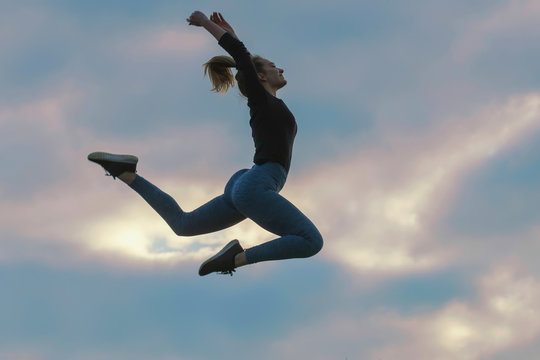Back
Why Running and Jumping Can Cause Leakage in Postpartum Women
By Dr. Christine Martirez PT, DPT on 3/27/2024

Bringing new life into the world is a miraculous journey, but for many postpartum women, the aftermath includes unexpected challenges, such as urinary incontinence. While it's a common concern, the root causes often lie beyond the pelvic floor. In this blog post, we'll delve into the research shedding light on why postpartum women may experience leaking after giving birth, particularly with high impact activities, focusing on musculoskeletal changes and the role of pelvic floor physical therapy in addressing these issues.
Unraveling the Factors Behind Postpartum Urinary Incontinence:
Musculoskeletal Changes Postpartum:
Research indicates that postpartum women may exhibit weaker hip muscles and reduced control of lumbar lordosis and anterior pelvic tilt compared to nulliparous women. These changes can affect overall stability and biomechanics during movement.Impact of Strength and Mobility Deficits:
Weakness in the hip muscles and compromised lumbar-pelvic control can result in altered gait patterns and increased impact forces when walking or engaging in physical activity. Postpartum women may inadvertently hit the ground with more force due to these deficits, placing additional stress on the pelvic floor muscles. This is especially important to note in regards to high impact activities such as running and jumping.
The Link Between Musculoskeletal Health and Pelvic Floor Function
Pelvic Floor Support and Stability:
Optimal function of the pelvic floor relies on a stable foundation provided by the surrounding musculoskeletal structures, including the hips, pelvis, and lumbar spine. Weakness or instability in these areas can compromise pelvic floor support and contribute to urinary incontinence.Impact of Movement Patterns:
Dysfunctional movement patterns, such as excessive pelvic tilt or maladaptive hip alignment, can place undue strain on the pelvic floor muscles. Over time, this repetitive stress can lead to pelvic floor dysfunction, including urinary leakage.
How Pelvic Floor Physical Therapy Can Help
Comprehensive Assessment:
Pelvic floor physical therapists conduct thorough assessments to identify musculoskeletal imbalances and movement dysfunctions contributing to urinary incontinence. This includes evaluating hip strength, lumbar-pelvic control, and gait mechanics.Targeted Rehabilitation Exercises:
Therapists prescribe tailored exercises to address muscle weakness and improve neuromuscular control in the hips, pelvis, and lumbar spine. Strengthening and stabilization exercises target key muscle groups to enhance overall support for the pelvic floor.Gait and Movement Training:
Pelvic floor physical therapy includes gait analysis and movement training to correct dysfunctional movement patterns and optimize biomechanics during activities of daily living. By promoting efficient movement mechanics, individuals can reduce stress on the pelvic floor muscles and alleviate urinary leakage.Education and Behavioral Strategies:
Therapists provide education on lifestyle modifications and behavioral strategies to manage urinary incontinence. This may include bladder retraining techniques, pelvic floor muscle exercises, and strategies for improving pelvic floor support during functional tasks.
Empowering Postpartum Women on Their Journey to Recovery
Holistic Approach to Healing:
Pelvic floor physical therapy takes a holistic approach to postpartum recovery, addressing not only pelvic floor dysfunction but also underlying musculoskeletal imbalances. By treating the body as a whole, individuals can achieve lasting improvements in urinary continence and overall well-being.Supportive Environment for Healing:
Pelvic floor physical therapy offers a supportive and nurturing environment for postpartum women to address their concerns and regain confidence in their bodies. With compassionate care and personalized treatment plans, individuals can navigate the challenges of postpartum recovery with strength and resilience.
Restoring Balance and Confidence in Postpartum Health
Urinary incontinence after childbirth is a common but often misunderstood issue. By recognizing the interconnectedness between musculoskeletal health and pelvic floor function, we can offer more effective solutions for postpartum women experiencing leakage. Pelvic floor physical therapy serves as a beacon of hope, guiding individuals on a path to recovery by addressing underlying musculoskeletal imbalances and empowering them with the tools they need to regain control over their pelvic health. If you're a postpartum woman experiencing urinary incontinence, know that you're not alone, and help is available through pelvic floor physical therapy. Together, we can restore balance and confidence in postpartum health, one step at a time.
Leaking with returning to exercise? If you have questions or concerns regarding your pelvic floor, please reach out to us at Pelvic Health Center in Madison, NJ to set up an evaluation and treatment! Feel free to call us at 908-443-9880 or email us at receptionmadison@pelvichealthnj.com.
Read More:
Fascial Counterstrain of the Musculoskeletal System By Shannon Strauch, PTA, STMT-1 on 10/21/2024 How treating cartilage and fascia can help reduce joint pain and improve organ function The Impact of Long-Distance Cycling on the Pelvic Floor: Pudendal Nerve and Pelvic Dysfunction By Dr. Christine Martirez PT, DPT on 10/18/2024 Learn how long distance cycling can impact the pelvic floor
Are you ready to live pain free?
Request An Appointment